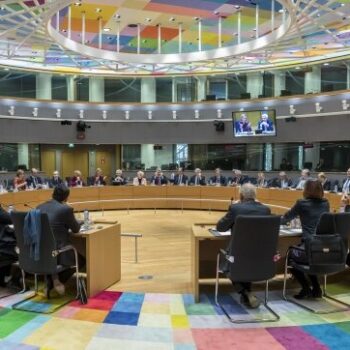Diplomats gathering in Bonn this month will have a tough balancing act to perform: implementing the Paris Agreement and raising its ambitions, while, simultaneously, dealing with the fallout from President Trump’s repudiation of the deal.
The official American delegation will be taking a lower profile than usual; ceding the limelight to the sub-national and non-state actors at COP23. These cities, states and companies have actually achieved a great deal for our planet, but climate diplomacy gets played out in multiple forums, not just at the UNFCCC. Diplomats around the world are feeling the heat from US delegations who are under orders to try turn back the clock to pre-Paris days. We urge these diplomats to stand firm. Follow their interests. Pivot to climate ambition and proceed even without the U.S. Here are a few proof points where we can see if the pivot to greater ambition is real, and not just rhetorical.
G19 or G20?
Argentina is to chair the G20 in 2018. Its diplomats face a stark choice: to build on the climate and energy plan as the G19 (without the U.S.) or agree to the U.S. demands to exclude climate from the agenda. It is a tough one for President Macri who declared 2017 as the ‘year of renewable energy’ and was a driving force behind the High Ambition Coalition in securing the Paris Agreement.
Is it better to have 19 of the world’s largest economies pushing forward on climate action or a watered-down communique signed by all 20?
Macri has to balance his relationship with China and Germany who want to push ahead with their G20 climate agenda with the US position.
The International Energy Agency
The International Energy Agency (IEA) Ministerial meeting is in Paris next week chaired by Sweden’s Minister Baylan. Representatives from the 29 IEA member countries plus accession countries, association countries, and partner countries will be in attendance. The U.S., the IEA’s biggest funder, is most likely to use its muscle to scrub all references to ‘climate’ and ‘clean energy’ in the outcomes document currently being drafted, even though “tackling climate change and air pollution” and “finding solutions to shared energy and environmental concerns” are listed as two of the four main areas of IEA focus. Hopefully, Minister Baylan, normally a reliable champion of climate ambition, will be able to navigate a path between the IEA’s budding new members and its biggest one.
Clean Energy Ministerial and Mission Innovation
In the Clean Energy Ministerial, the U.S. is promoting two new initiatives on nuclear and carbon capture and storage – even though the name on the tin is ‘clean energy’ – and the other members are permitting it. While the U.S. relinquished its seat at the head of the table for Mission Innovation – to the European Commission and the UK– it’s still allowed to participate despite cutting its R&D budgets when the purpose of Mission Innovation was to double domestic budgets for clean energy R&D. Will anyone kick up a stink?
Unity or integrity?
The U.S. officials are basing their positions on Trump’s ‘America First’ worldview. In the conversations taking place across multiple forums, what are counter-parties to do? Do they choose unity with the U.S. government’s position or protect their own interests, the integrity of their institutions and raison d'être?
If they capitulate to whatever the U.S. demands, they will surely pay a price back home where constituents will want to see a muscular response from their own leaders, not to mention access to new economic opportunities. If they isolate the US, they risk undermining the institutions and the global rules-based system, playing into the hands of the Erdogans and Putins of this world. It is clearly foolhardy to wait it out. We can ill afford to wait four more years for ambitious climate action. And besides, stuff happens. Big stuff and the more mundane decisions like whether to include climate on the agenda or in the communique.
What will happen if they reaffirm Paris?
These are not simple choices. Wherever these conversations land on climate, there will be consequences; not just to our planet, but nearer-term political consequences too. These have to be carefully considered. But what would happen if Trump’s America First policy was diplomatically contained and in all these instances diplomats maintain a clarity of purpose and reaffirm Paris and fight for even more ambitious climate action? Will they be punished by more than a few Tweets? Could the Trump administration penalise all America’s main trading partners?
The withdrawal of U.S. soft power has created a huge amount of space on the global stage for creative alliance-building; It is clear by now that Beijing is expanding its circle of friends. Of all the issues where the present U.S. administration is at odds with the global community, and there are many, climate change is probably the best battlefield to test out new strategies. President Trump’s decisions on trade thus far are not being driven by his positions on climate change. President Trump has the least leverage on climate and does he really care about the issue? Remember even Exxon Mobil lobbied in favour of the Paris Agreement, and Trump’s final decision came down to the wire.
Follow the national interest
A lot will depend on who the interlocutors are. Many will be civil servants trying to do their job, as defined by statute. The G7 Agriculture Ministerial got the U.S. to agree to the “climate threat to food security”. Not everything will be elevated to the political stratosphere. And if it is, don’t get into a flap, follow your interests and take the most ambitious climate action anyway. Remember, foreign diplomats are not just reacting to events, they are also shaping them and to an extent, the success or failure of Trump’s America First approach partly depends on the choices they make today.
It took two decades of conversations to deliver the Paris Agreement, only two countries have opted out; shielding it from those who want to sabotage collective efforts to solve common problems is in everyone’s national interest, including the USA.


